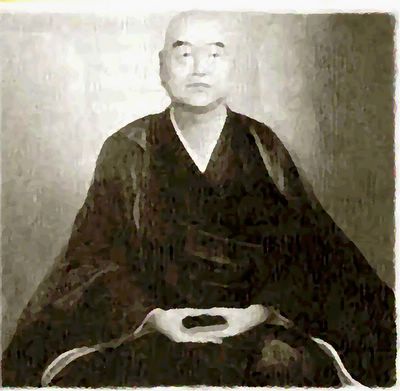
With all of my talk about food yesterday, I completely forgot that it was also Dogen's birthday!
Dogen Zenji (January 19, 1200 - September 22, 1253), a title which translates literally to "Elementary-Way Zen-Master," was a Japanese Zen teacher and founder of the Soto school of Zen in Japan. He was a leading religious figure and important philosopher.
He came from a noble family and he quickly learned the meaning of the Buddhist word "mujo" (impermanence). His parents died when he was still young, and it is said that this early glimpse of impermanence inspired him to become a monk. He went first to Mt. Hiei, which was the headquarters of the sect he studied. In his young age, he questioned that "Both the esoteric and external doctrines of the Buddha teach that enlightenment is inherent in all beings from the outset. If this is so, why do all the Buddhas, past, present, and future, seek enlightenment?" This doubt led him to study Buddhism under the Rinzai teachers Eisai (1141 - 1215) and Myozen for nine years.
In search of the truth, he went to China accompanied by his teacher, Myozen, at the age of 24, even though crossing the ocean was dangerous at that time. After visiting well-known monasteries, he came to study with Ju-tsing (J. Nyojo), the 13th Patriarch in Mt. Tien-tung (J. Tendo). This lineage would become known as the Soto school in Japanese. Two years after, he finally realized liberation of body and mind, free from ego.
Dogen came back to Japan after four years abroad. In 1244, he established Eihei-ji, the main Soto monastery, in Echizen (now Fukui) to spread his Buddhist religion. The temple is still one of the two head temples of the Soto sect today. He spent about 10 years teaching there.
Dogen's masterpiece is the Shobogenzo, a collection of essays on the Buddhadharma in 95 chapters that reveal his thoughts and faith. He employed Japanese language to write, which was unconventional in that time, and put down the point in simple, logical and concise style. He was followed by Keizan (1268 - 1325), who popularized Soto Zen.
"Cease from practice based on intellectual understanding, pursuing words, and following after speech, and learn the backward step that turns your light inward to illuminate your self. Body and mind of themselves will drop away, and your original face will be manifest."
- Dogen

1 comment:
I like "Fundamental Way" a little better The "gen" or "moto" kanji (元
) means "basis" as well as element. Eihei (永平
) means "eternal peace."
Dogen was a contempory of Thomas Aquinas, oddly enough (1225-1274), separated by about 25 years in birth though.
It's interesting that 2 of the greatest philosphers of East and West probably never knew of each other.
Post a Comment